'This makes me scared for young girls': Jacksonville youth feel misunderstood after Roe overturned
Shyanne Padgett, 20, knelt on the pavers in James Weldon Johnson Park, just across the street from City Hall.
She was home when she started receiving news alerts about the Supreme Court's decision to overturn Roe v. Wade — in turn stripping people's constitutional right to receive an abortion. She felt helpless, she said, she started crying. She was angry — and she needed to do something with her energy.
Armed with poster board, a fistful of Crayola markers, her portable Bluetooth speaker, and a gallon of lemon lime Gatorade, she headed downtown.
In pink and purple bubble letters, she worked on a sign that said "WHAT NEXT, MY RIGHT 2 VOTE?"
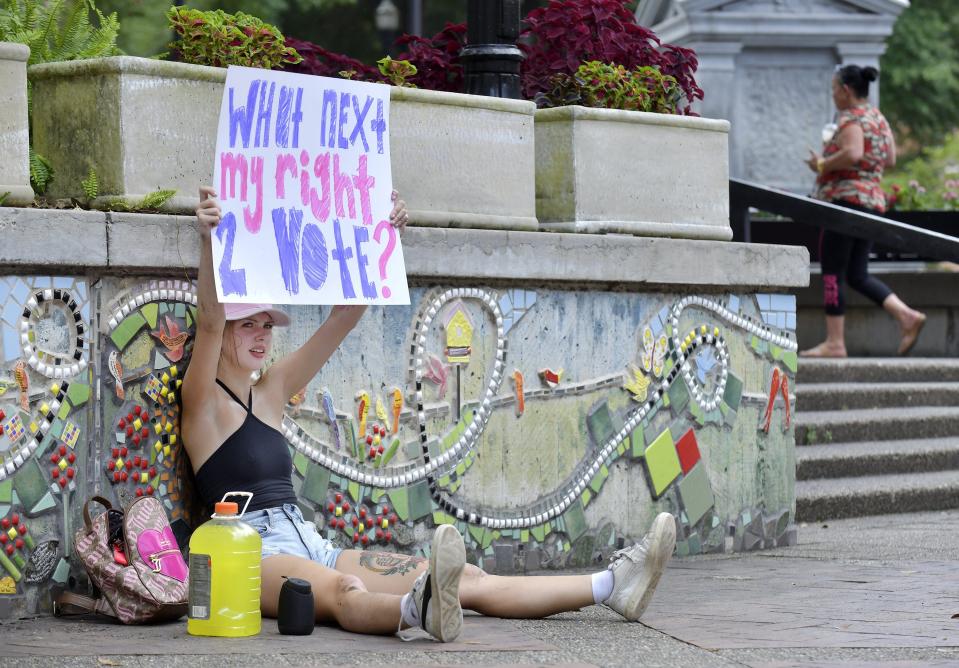
She began queuing up a playlist — "decisions mean more and become more dangerous if we don't make noise," she said.
Q&A: Five questions about abortion access in Florida
History of abortion activism in Jacksonville: Protests, arrests and even a pipe bomb
'Our bodies, our choice': Hundreds gather at Duval County Courthouse in rally for abortion access
For hours, Padgett sat at the park alone. People in Jacksonville were just finding out about the landmark ruling. Some were at work. They walked past her to grab lunch from a food truck and head back. Others were already organizing.
A small group of Planned Parenthood PAC members spoke across the way at City Hall in opposition to the decision. Hours later, Padgett would be joined by hundreds of other protestors who met at the courthouse and marched downtown.
Many of the protesters were high school and college-aged. Some aren't yet old enough to vote.
They say they're frustrated with an old guard making decisions that impact their generation. From gun control to climate change and now reproductive rights, young people say they're tired of adults' choices unlocking repercussions on their generation without including them in the conversation. Now, through student-led groups like March For Our Lives, the Sunrise Movement and Gen Z for Change, they're advocating for the actions they want to see.
Kennedy Murphy is a rising high school junior at Stanton College Preparatory School. She said knew she from following the news that Roe v. Wade could be at risk, but she was still in disbelief when she heard.
"This makes me scared for young girls, specifically those who aren't in a position of privilege — those who can't afford to travel to another state or pay for a child or healthcare," she said. "I am especially horrified that much of the new legislation being passed, specifically Florida's 15-week ban, doesn't include exemptions for rape or incest. This is detrimental to the mental and physical health of women."
A young activist herself, Murphy has organized student protests centered around making Duval County Public Schools' dress code policy more equitable.
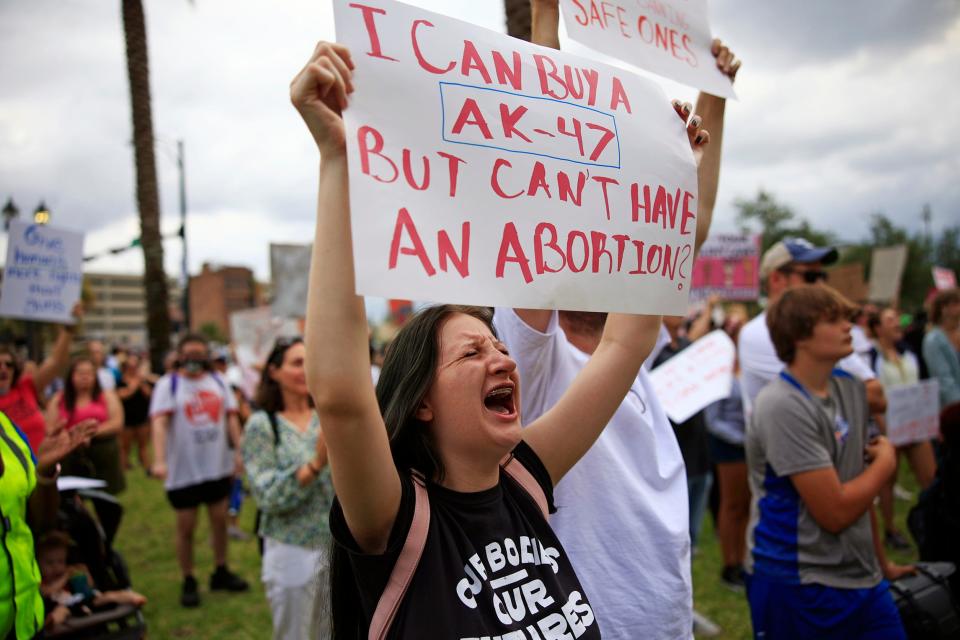
In Florida, a new law signed by Gov. Ron DeSantis will decrease the window for people to receive abortions from up to 24 weeks pregnant to up to 15 weeks. The new law is expected to go into effect Friday — pending a Circuit court ruling — and has no exceptions in place for rape or incest.
Studies show that late confirmation of pregnancy is common and typically higher among young people, BIPOC people and those living in poverty and that people who aim to get an abortion and succeed are less likely to be in poverty than those who seek one but fail. Reproductive rights advocates say bans within the first trimester of pregnancy disproportionately put those groups of people at higher risk. While the majority of abortions occur within the first 13 weeks of pregnancy, the removal of Roe v. Wade could potentially criminalize people getting abortions later in their pregnancy to save their own life or abort a fetus with severe medical defects.
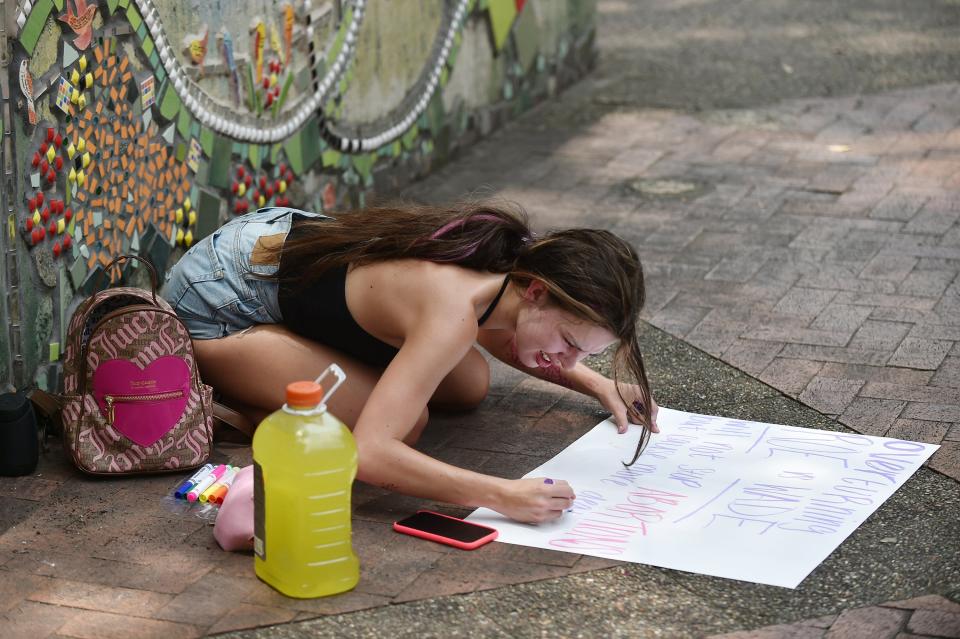
"I can't believe they're still doing this sh*t," Padgett said of the SCOTUS decision. "It's not going to stop abortions, just safe abortions ... all it's going to do is cause more deaths."
Groups like the Jacksonville National Organization for Women and the Florida Access Network say that the Supreme Court's decision will shrink American access to safe abortions and put more people in danger.
The 'post-Roe generation'

As protests rolled out throughout the country Friday, smaller counter-protests also unfolded. Photos published in national news outlets showed some young people celebrating the overturning of Roe vs. Wade, holding signs that said things like "I AM THE POST-ROE GENERATION."
Those signs were made by Students for Life, an anti-abortion advocacy group that formed in 2006 and works to mobilize students across the country to abolish abortion.
On social media, a University of North Florida rising senior, Eleanor Ascheman, posted an Instagram Reel celebrating the Supreme Court's decision. In the video, Eleanor records herself dancing and attached a caption that said "we are the prolife generation."
Ascheman is the outgoing president of the university's Students for Life chapter. She says as the likelihood of Roe being overturned increased, she noticed the tension at club events intensifying.
"This past year, we've definitely gotten a lot more middle fingers and people yelling or cursing at us on their way to class when we table," she told the Times-Union. "I found that both sides are very passionate about helping women and limiting suffering in the world — the pro-life side just also prioritizes the life of the fetus and doesn't think that we need abortion to be successful ... I don't think you can truly have a neutral stance on abortion."
Ascheman said she feels like tools including social media can help amplify young people's voices and that most of her friends and peers are engaged in at least one social justice issue. And while she's pleased with this particular court ruling, she still gets frustrated when people prematurely judge who they think her movement is comprised of.
"[It's] not just old white men wanting to control women," she said, explaining that young, diverse people can also hold pro-life ideology.
Ascheman, along with Christian McGrew, another club member and rising senior, say they believe it's a fundamental human right to be protected from conception.
They added that as part of their group's mission, their hope is to continue to help young people in Jacksonville who have unintentionally become pregnant.
"Eleanor and I have made it a priority in our Students for Life chapter to promote and spread awareness to the countless free resources for pregnant mothers in our city," McGrew said. "While I absolutely support and hope for pro-life laws, I believe that the way we will ultimately end abortion is through changing hearts and minds."
Others say they don't see it that way.
Further stress for local queer youth
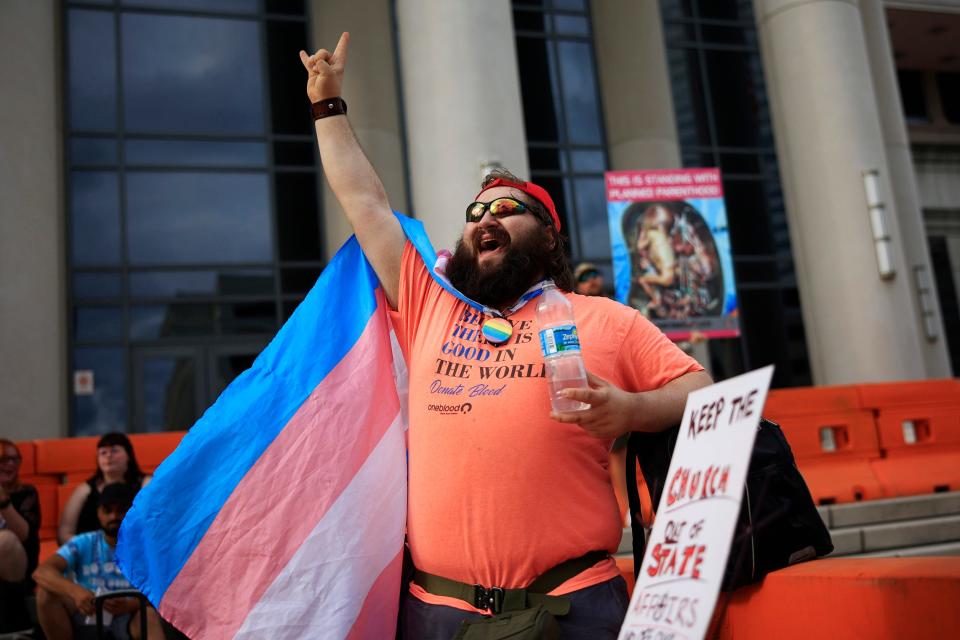
Underrepresented groups that could be put at further risk now that Roe v. Wade has been overturned include members of the LGBTQ+ community. This is in part because the decision impacts anyone who can become pregnant — including nonbinary individuals, transgender men and their partners.
"My biggest concern is how overturning Roe will affect trans, nonbinary, and other people with uteruses who don’t identify as women," Lissie Morales, a rising junior at UNF and member of the school's Students for a Democratic Society, told the Times-Union. "Overturning Roe seems like it gives states power over a reproductive issue, however for some trans people, this is a state-sanctioned death sentence."
They added, "trans people face countless hurdles in accessing healthcare as transphobia within the medical community is rampant."
In Florida, the state Surgeon General Joseph Ladapo and Florida Agency for Health Care Administration are aiming to ban transition-related care for transgender minors and strip Medicaid coverage for transgender people of all ages receiving treatments including hormone replacement therapy, gender reassignment surgeries and puberty blockers. Advocates call the moves an outright attack on the LGBTQ+ community.
More: Critics fear new Duval Schools LGBTQ+ guide strips student protections
Morales worries this will just pile on.
"Pregnancy is a blessing to some, but to other trans people, it is debilitating and dysphoria-inducing," they said. "Taking away a life-saving procedure from so many would have unspoken negative effects, especially on trans people."
Beyond that, young people worry that overturning Roe v. Wade could cause a slippery slope and keep them from loving — or one day marrying — the person they love. Supreme Court Justice Clarence Thomas already suggested in his concurring opinion that the court should reconsider overturning the Obergefell v. Hodges case, which gave same-sex couples the right to marry.
"Roe v. Wade was the precedent for gay marriage. Something that I was alive for it to pass. I was entering eighth grade when we got the news — 12 years old. I am now 20 and the possibility of it no longer being a thing literally has made me sick," said Kathryn 'KJ' Fox, 20, who attends UNF. "I saw it on Friday and one of my first thoughts was should I change my pronouns on Instagram and take down any posts that hint to me being queer so in case it becomes a problem I am safe? It was a terrible thought."
Fox said their 17-year-old sister removed everything LGBTQ+-related from her Instagram profile.
"I'm genuinely terrified about the future of being queer," they said. "More people are out than before. I don't think they will overturn it. But a lot of people didn't think they would actually overturn Roe v. Wade either."
'Our rights are a campaigning point'
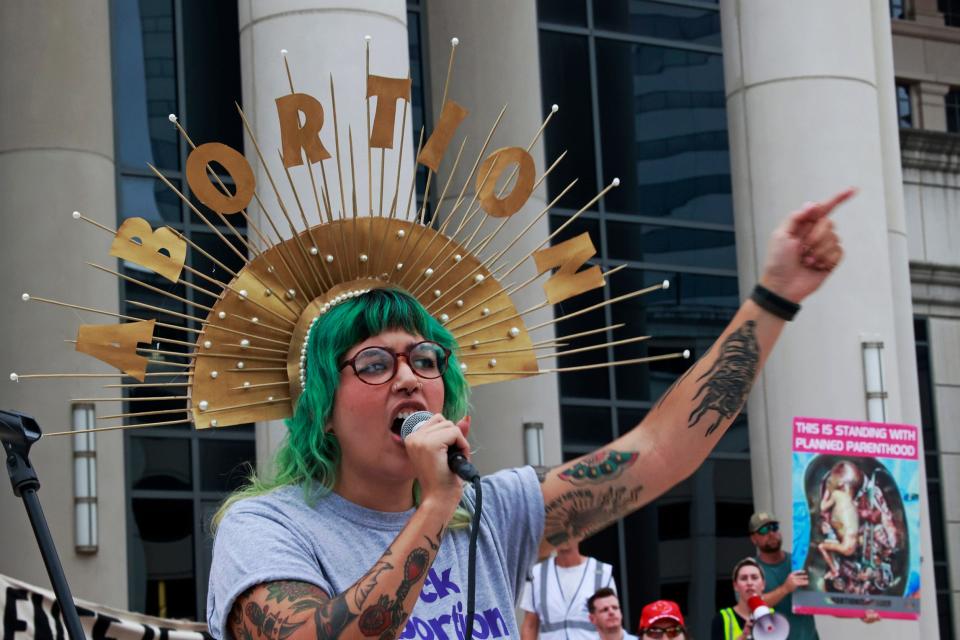
Morales says the last week's events leave young people like them, feeling disenchanted and frustrated with politics. They are 18 years old.
"[I and other people on the internet received] texts from Biden's campaign saying that now that Roe is overturned, it is 'our responsibility to rush $15 to the Democratic National Party,'" they said. "It is absolutely disturbing and outrageous that our rights are and will continue to be a funding or campaigning point for them when they had absolutely every opportunity to codify it [Roe v. Wade] into law for decades but chose not to do so. And they will most likely continue to sit back and watch while more rights get taken away, as they're doing now."
On social media, Democratic candidates and current politicians in office using abortion access as a campaign strategy are getting shredded by young people. A satirical article by Reductress published on Monday, titled "I Donated $15 to Nancy Pelosi and She Spent It on the Panera ‘You Pick Two’" had been liked more than 31,000 times on Instagram. On platforms like TikTok, young people are expressing outrage toward politicians in office.
One TikTok trend going around features young people calling the Supreme Court a scam. In the videos, users of younger generations cite a growing apathy toward the Court and its Justices, who receive lifetime appointments from political representatives that are typically decades older than their constituents.
"These old people don't care about us, or about anything health-related other than just not wanting to be pregnant," Fox said. "They just care about their supporters."
Frustrations are not just reserved for those who are pro-choice. McGrew from UNF's Students for Life club said he's noticed politicians using this moment as an opportunity to gain exposure.
"I do feel like a lot of politicians use it as a campaign item or fundraising effort instead of actually trying to make progress," he said.
Morales said it's time for their generation to rise up.
"Now that they’ve failed us time and time again, we need to get the old white democrats out of office and put in new and progressive younger people who will actually uplift reproductive justice and defend the rights of people all over the country," Morales said. "And we will do this until we have a mass of public servants who will actually bring the change we need to see in this country — even if that means stepping up to the plate and holding office ourselves."
Emily Bloch is a youth culture and education reporter for The Florida Times-Union. Follow her on Twitter or email her. Sign up for her newsletter.
This article originally appeared on Florida Times-Union: Jacksonville youth voice concerns, frustration on abortion issues

